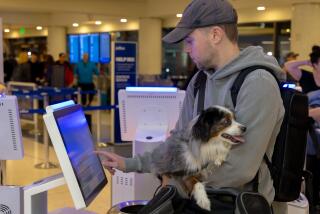Globalism at 35,000 feet
- Share via
HOW MUCH WOULD you pay to enjoy six hours away from your fellow humans, in a chair that reclines? $1,500 an hour -- or even more? And if someone invited you to spend $9,000 to pass a long afternoon in a fairly cramped lounge, munching peanuts and reading airline magazines, would you accept? How desperate are you to have access to 15 movies you’d never pay to see in a theater, instead of 11?
I often think that the airline executive who came up with the idea of business class should get his name on an endowed chair at the Harvard Business School -- and his face on a most-wanted poster.
These seats somewhere toward the middle of planes are where airlines make most of their revenue. But for passengers, they are the place where the laws of reason, much like the laws of gravity, no longer seem to apply. To fly business class from New York to London can cost $9,600 on British Airways, and to fly first class costs more than $14,000. A coach seat will set you back roughly $500.
Look at those figures again. Who in her right mind would pay $9,000 for six hours -- or eight, if you include time in the airport -- of slightly elevated comfort? Someone who is not paying for her own travel, perhaps, and longs to be a little closer to those billionaires and movie stars who dropped the full $14,000 to be a few extra feet away from the riff-raff.
On the ground, a traveler might expect to pay $100 to get 24 hours of extra comfort in a hotel’s upgraded suite or an executive floor room. But as soon as we take to the skies -- and become a kind of captive audience -- we will pay $9,000 for a little more of the food that we’d gladly have much less of.
The age of airline deregulation has brought a carnival of “luxury discount” carriers, genuine discount carriers, frat-boy parties in the heavens and fly-by-night operations that change their names or colors before you’ve got a boarding pass. But what it’s really brought us is the worst side of globalism, in compact form.
It begins with the inequity of prices. Those paying thousands for the upper deck of the jet effectively set up a gated community in the air, in which people from other classes are not even allowed to visit their restrooms. It continues with the startling inequality of services -- and the unsurprising fact that the countries that often score highest for quality of life (Singapore, Australia, New Zealand) also are the ones that offer the most comfortable coach habitations in the sky.
It turns upon the dividedness that moves some people to fly across Europe on EasyJet for less than the price of a bus ride, while others strap themselves into Virgin Atlantic Airways Upper Class seats for more than the price of a new car. And it ends with perfect chaos. I got a choice of 60 movies in an Asian carrier’s economy class section last year, and, only a few weeks later, in an exorbitant business class seat of a U.S. airline, got just five. The end-of-the-line luxury logic: You pay much more to get much less.
The individual details are less important, though, than the economic assumptions behind the scam. Better seats should cost maybe 20% more, or (for movie stars) 50% more. But 1,900%?
You don’t have to be a philanthropist to realize that by enduring slightly more human company for six hours, you could build nine homes in Burundi, each big enough to house 10 people with the money left over. And even if you want to keep the savings for yourself, with $9,000 extra you could take five weeklong, all-inclusive tours to Southeast Asia, for the price of just an afternoon’s greater comfort en route to London.
Globalism is something most of us have to accept. But as we look to our summer vacations, maybe some of us can make a small bid for justice, or prudence, or just the pleasure of taking 19 trips for the price of one. These days, common sense can be found mostly in the back of the Airbus.
More to Read
Sign up for The Wild
We’ll help you find the best places to hike, bike and run, as well as the perfect silent spots for meditation and yoga.
You may occasionally receive promotional content from the Los Angeles Times.






